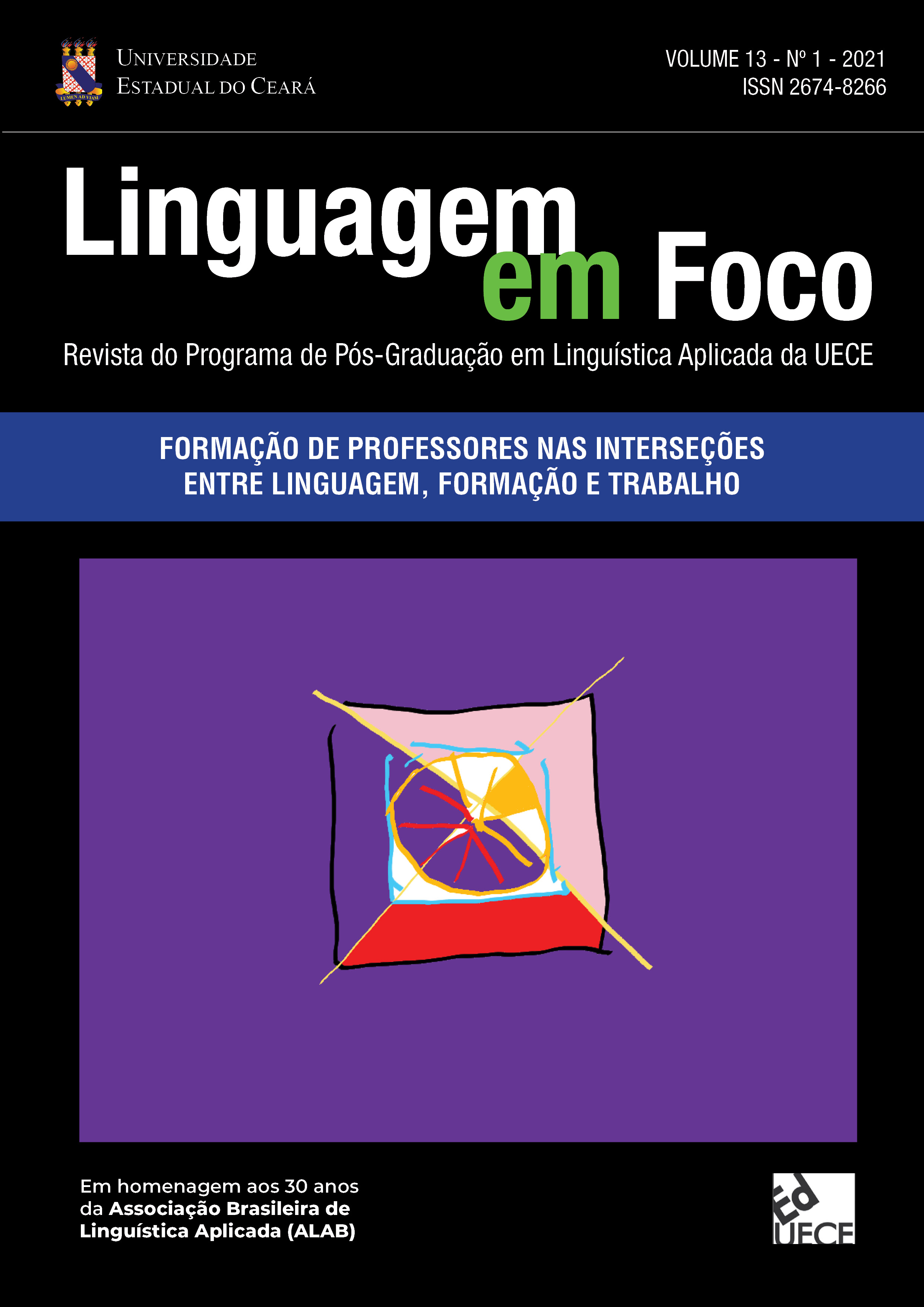The activity-affectivity relationship in the initial education of a French teacher
DOI:
https://doi.org/10.46230/2674-8266-13-5454Keywords:
Affects, Teacher education, Activity Clinic, Student teacherAbstract
The affectivity of the worker and their intellect walk together, therefore, it is relevant to take into account the importance of affections for the work activity. In this perspective, the present article aims to investigate how a student teacher is affected in her teaching practice, identify the factors that interfere/act in this affectation, and understand how this teacher is affected in her training when facing herself. To do so, we resorted to theoretical principles of Activity Ergonomics; Activity Clinic; Spinoza's theory of affections; and Bakhtin and the Circle's philosophy of language. This investigation is a piece of a research on teaching activity and teacher training conducted with two French student teachers at a public university, between 2011 and 2013. This study brings classroom situations and simple self-confrontations (ACS) with one of the participants. Based on ACS dialogues, we analyze statements that indicate affectation of the student teacher in her activity and in her training. In our analyses, we noticed that the student teacher suffers a decrease in her power to act, having her activity amputated as a result of working with a class that presents some challenges; at the same time, we observed an increase in her power to act as a student, since she sees herself capable of changing situations in the classroom in which she finds herself as a student, and, from there, she discovers a new way of being a teacher after confronting herself.
Downloads
References
AMIGUES, R. Trabalho do professor e trabalho de ensino. In: MACHADO, A. R. (Org.). O ensino como trabalho: uma abordagem discursiva. Londrina: Eduel, 2004. p. 35-53.
BAKHTIN, M. Estética da criação verbal. Tradução: Paulo Bezerra. 6. ed. São Paulo: Martins Fontes, 2011.
BAKHTIN, M. Problemas da poética de Dostoiévski. Tradução: Paulo Bezerra. 5. ed. Rio de Janeiro: Forense Universitária, 2015.
BRAIT, B. Análise e teoria do discurso. In: BRAIT, Beth. (Org.). Bakhtin: outros conceitos-chave. 2 ed. São Paulo: Contexto, 2014. p. 9-31.
BRAIT, B.; MELO, R. Enunciado/enunciado concreto/enunciação. In: BRAIT, B. (Org.). Bakhtin: conceitos-chave. 5. Ed. São Paulo: Contexto, 2012. p. 61-78.
CELANI, M. A. A. A transdisciplinaridade na Linguística Aplicada no Brasil. In: SIGNORINI, Inês; CAVALCANTI, Marilda. (Org.). Linguística Aplicada e transdisciplinaridade. São Paulo: Mercado de Letras, 1998. p. 129-142.
CLOT, Y. L’affectivité en activité. In: BARBIER, J. M.; DURAND, M. Encyclopédie d'analyse des activités. Paris: PUF, 2017. p. 877-909.
CLOT, Y. A interfuncionalidade dos afetos, das emoções e dos sentimentos: o poder de ser afetado e o poder de agir. In: BANKS-LEITE, L.; SMOLKA, A. L. B.; ANJOS, D. Di. (Orgs.). Diálogos na perspectiva histórico-cultural: interlocuções com a clínica da atividade. Campinas, SP: Mercado de Letras, 2016. p. 87-95.
CLOT, Y. Trabalho e poder de agir. Tradução: Guilherme João de F. Teixeira e Marlene Machado Z. Viana. Belo Horizonte: Fabrefactum, 2010.
CLOT, Y. A Função Psicológica do Trabalho. Tradução: Adail Sobral. 2. ed. Petrópolis, RJ: Vozes, 2007.
COSTA, A. J. A.; PASCUAL, J. G. Análise sobre as emoções no livro Teoría de las emociones (Vigotski). Psicologia & Sociedade, 24(3), p. 628-637, 2012. Disponível em: https://www.scielo.br/pdf/psoc/v24n3/16.pdf. Acesso em: 15 mar. 2021.
FARIAS, A. L. G.; MORAES, R. M. A. Práticas de análise da atividade na formação inicial de professores de francês como práticas linguageiras formativas. In: FRANÇA, M.; SOUZA, A. J.; GRANGEIRO, C. R. P.; PEREIRA, M. L. S. (Orgs.). Estudos linguísticos: abordagens contemporâneas. Araraquara: Letraria, 2020. p. 160-192.
MAGALHÃES, E. M. Análise dialógica da atividade linguageira de professores formadores de línguas inglesa e espanhola: implicações das abordagens clínica e ergonômica da atividade na formação inicial. 2019. 357 f. Tese (Doutorado em Linguística Aplicada) – Universidade Estadual do Ceará, Fortaleza, 2019.
MOITA LOPES, L. P. Introdução. Uma linguística aplicada mestiça e ideológica. Interrogando o campo como linguista aplicado. In: MOITA LOPES, L. P. (Org.). Por uma linguística aplicada indisciplinar. São Paulo: Parábola, 2006. p. 13-44.
MORAES, R. M. A. Análise da atividade de professores de francês e elaboração de uma estratégia e de uma engenharia de formação profissional contínua: uma experiência na Universidade Estadual do Ceará. (Projeto de Pesquisa). Programa de Pós-graduação em Linguística Aplicada, Universidade Estadual do Ceará, 2013.
SOBRAL, A.; GIACOMELLI, K. Observações didáticas sobre a análise dialógica do discurso – ADD. Domínios de Lingu@gem, v. 10, n. 3, p. 1076-1094, 2016. Disponível em: http://www.seer.ufu.br/index.php/dominiosdelinguagem/article/view/33006. Acesso em: 18 jun. 2020
SPINOZA, B. Ética. Tradução: Tomaz Tadeu da Silva. 2. ed. Belo Horizonte: Autêntica, 2019.
VIGOTSKI, L. S. A formação social da mente. Tradução: José Cipolla Neto, Luís Silveira M. Barreto e Solange C. Afeche. 7. ed. São Paulo: Martins Fontes, 2007.
VOLÓCHINOV, V. A palavra na vida e a palavra na poesia: ensaios, artigos resenhas e poemas. Tradução: Sheila Grillo e Ekaterina Vólkova Américo. 1. Ed. São Paulo: Editora 34, 2019.
VYGOTSKI, L. Théorie des émotions. Paris: l’Harmattan, 1998.
YVON, F.; SAUSSEZ, F. Introduction. In: YVON, Frédéric; SAUSSEZ, Frédéric. (Org.) Analyser l’activité enseignante: Des outils méthodologiques et théoriques pour l’intervention et la formation. Québec: Presse de l’Université Laval, 2010. p. 73-104.
Published
How to Cite
Issue
Section
License
Copyright (c) 2021 Marina Cavalcanti Tavares Clemente, Wescley Batista Lopes, Rozania Maria Alves de Moraes

This work is licensed under a Creative Commons Attribution 4.0 International License.
Authors who publish in Linguagem em Foco Scientific Journal agree to the following terms:
- Authors retain the copyright and grant the journal the right of first publication. The articles are simultaneously licensed under the Creative Commons Attribution License which allows sharing the work with an acknowledgement of its authorship and initial publication in this journal.
- The concepts issued in signed articles are the absolute and exclusive responsibility of their authors. Therefore, we request a Statement of Copyright, which must be submitted with the manuscript as a Supplementary Document.
- Authors are authorized to make the version of the text published in Linguagem em Foco Scientific Journal available in institutional repositories or other academic work distribution platforms (ex. ResearchGate, Academia.edu).





























